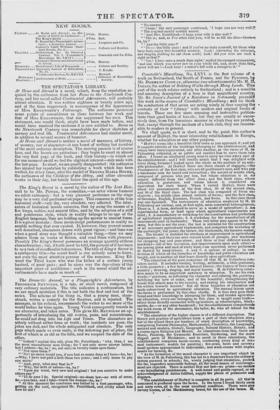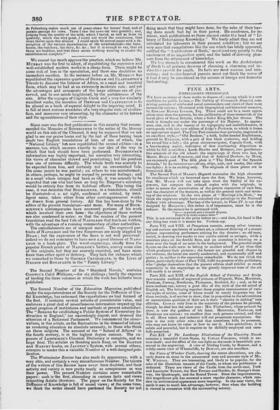Constable's Miscellany, No. LXVI. is the first volume of a
work on Switzerland, the South of France, and the Pyrenees, by Mr. DERWENT CONWAY, otherwise (see advertisements) Mr. H. D. INGLIS, the author of Solitary Walks through Many Lands. This part of the work relates entirely to Switzerland ; and is a sensible and amusing description of a tour in that magnificent country, Mr. Sr. JOHN'S Journal of a Residence in Normandy preceded this work in the course of Constable's Miscellany ; and we think the conductors of that series are acting wisely in thus varying the contents of their " Library" with modern and original books of travels. There are few more amusing and instructive publica- tions than good books of travels ; but they are usually so exces- sively dear, from the luxurious manner in which they are 'printed, that, except through the medium of a book club, they are inacces- sible to readers in general. We shall quote, as it is short, and to the point, this author's account of Hofwyl, the most interesting establishment in Europe, whether for education or any other purpose. " Hofwyl seems like a beautiful little town as you approach it ; and yet it consists entirely of the buildings belonging.to the establishment, and
which have been constructed, one after another, as the views of M. de
Fellenberg extended, or as public aid enabled him to carry them into effect. I found an intelligent young man to carry me over every part of
the establishment ; and I will readily admit that I \ V4S delighted with
every thing, because I looked upon. the whole as the pastime of it ami- able philosopher. At Hofwyl there are three classes of stikelepts,—;the Penstonnaires of the first class, who are all gentlemen's sons, and- who pay
a handsome sum for board and instruction ; the second or middle class, composed of persons who ,pay less, but whose education is in net
respect different from the other class ; and the third class, whose education is gratuitous, and whose labour is considered art equivalent for their board. When I visited Hofwyl, there were
about 100 pensionnaires of the first class, 30 of the second class. and 90 of the third class. The last class was composed of Swiss ex. elusively ; the middle class almost entirely of Swiss ; and the first class, of Germans, English, Russians, French, and Swiss. In this class there
was one Spaniard. The instruments of education employed by M. de Fellenberg are various, and, at first sight, seem somewhat heterogeneous.
There is, 1. A farm, destined to serve as a model of agriculture ; 2. ha experimental farm, or land upon which agricultural experiments are tried; 3. A manufactory or workshop for the construction and perfectiort of agricultural implements; 4. A workshop for the manufacture of all instruments used in husbandry. These two latter may appear to be the same, but this is not the case ; the last is intended for the construction of all necessary agricultural implements, and comprises the workshop of the cartwright, the joiner, the turner, the blacksmith, the harness. maker, &c. The former is destined for attempts at improvement in agricultural implements ; and there are seen various kinds of ploughs, new machines
for chopping hay and peas-straw, and three or four different kinds of machines—(all of late invention, and improvements upon each other)— for sowing grain and seed of every kind,—an operation never performed at Hofwyl by hand-labour. 5. and (i. A species of college, in one division of which all the branches of knowledge and polite education are taught, and in another all that bears directly upon agriculture. "The education of the poor comprises all that M. de Fellenberg con.' siders useful. It includes reading, writing, arithmetic, a little grammar,
a little geometry ; a few facts in natural history ; the history of their own country ; drawing, singing, and moral lessons. M. de Fellenberg consi- ders music to be an important auxiliary in education. To use his own words= precious, as softening the character and calming the passions; fortifying the love of order, and of the beautiful; strengthening the bonds that attach man to his country, and raising his imagination and his wishes towards heaven.' But all these branches of education are made subservient to agricultural education. The manual labour upon the farms is performed by this class chiefly. It is thus they gain their
bread and their knowledge in labouring for them; and besides agricultu- ral education, every one belonging to this class is taught some trade— either those directly connected with agriculture, as wheelwrights, black- smiths, &c.—or any other handicraft ; for the establishment comprehends the work-room of the shoemaker, the tailor, &c. who all labour for the establishment.
"The education of the higher classes is of a different description. The theory and practice of agriculture form a part of their education also; but in the school there are teachers of every description of knowledge, comprising Natural Philosophy, Mathematics, Chemistry, the Languages,. ancient and modern, History, Geography, Natural History, Botany, and a course upon Religion and Morals. As relaxations from this, there are Music, Painting, the Gymnastic Exercises, Gardening, and the more elegant parts of Mechanics ; and to assist in these relaxations, the establishment comprises music-rooms, containing every kind of mu. sical instrument; models for painting ; fire-arms, bows and arrows; small gardens appropriated to individuals ; and work-rooms with imple. merits for turning, &c.
"As the formation of the moral character is one important object ha the view of M. de Fellenberg, this has led to a departure from the ordinary system pursued in schools; for, wisely judging that emulation, pushed too far, engenders unamiable feelings, all, the usual means of encourage- ment are rejected. There is neither first nor last—no prizes—no medal ,—no humiliating punishments. A well-tuned. and gentle reproof, or ars acknowledgment of duties fulfilled, supply the places of premiums. tuait diagram. "The establishment of Hofwyl is complete in all its parts. All that is consumed is produced upon the farms. In the byres I found thirty oxen and sixty cows, all in the most excellent condition. There were also twanty horses, of the Mecklenburg breed, for the use of the Walk. M. de Fellenberg makes much use of . pease-straw for horses' food, and Of potato-parings for cows. These I saw the cows eat very greedily ; and, Judging from the quality of the milk, which I tasted, as well as from its quantity, which was very great, I could not avoid the conclusion, that cows thrive upon this aliment. I could easily fill several pages with a de- scription of the various dependencies of the establishment—the bake- house, the butchery, the dairy, &c. Re.; but it is enough to say, that all these are faultless, and that there seems nothing wanting to render the establishment complete."



























 Previous page
Previous page